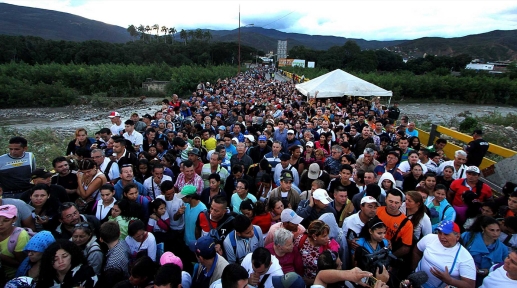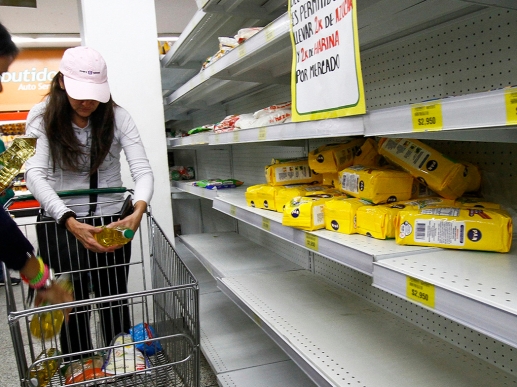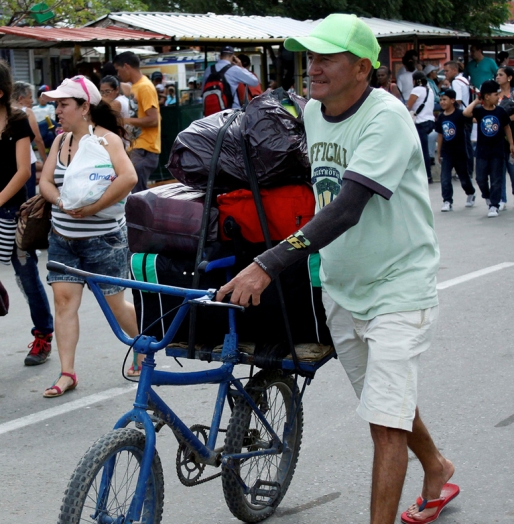
Venezuelans crowd the Simon Bolivar bridge in the border with Colombia waiting for its opening to go buy food and supplies there.
I have been fascinated by the events at the Venezuela-Colombia border for the last two weekends, as the Government decided to open a relief valve and let Venezuelans go over to Colombia for the day to shop. The scenes have been fascinating, but more importantly, the political, social and most of all, economic significance of what we have seen is simply riveting.
Start with the fact that the Government shut down the border a year ago in order to supposedly stop contraband from Venezuela to Colombia. An explanation which was simply grandstanding, as the contraband flows through the hundreds of unpaved paths (trochas) that criss-cross the border under the watchful eye (and sponsorship) of the Venezuelan military. Thus it was simply a remarkably sight, as well as lesson to the Government, to see an estimated 135,000 Venezuelans cross the border this weekend alone, in order to purchase the food, medicines and supplies that they can no longer buy in their own country.
This is exactly the opposite of what the Government had shut down the border for.
But the more important lesson is how Colombia´s distribution system is so much more superior to the Venezuelan one by allowing markets to run things. Not only can Colombia feed Colombians, but border supermarkets did quite a good job in providing food for 135,000 Venezuelans overnight. Yes, they did run out of some stuff, which was not unexpected, but there was also a transportation strike which influenced the fact that some supermarkets actually run out.
And imagine how many Venezuelans had to feel to have to go to Colombia to buy that very Venezuelan product Harina Pan, which was not only fully stocked on the other side, but to the surprise of many that were not aware of it, it was actually made in Colombia and was made there by the Venezuelan company that the Chavista Government has demonized so much: Industrias Polar. Not only do markets work, but companies can move from one country to another looking for the best conditions to operate in. A lesson Maduro and his cronies simply will not understand.

Venezuelans buy Colombian’made Harina Pan in Colombia at roughly a dollar a package
And Colombia´s distribution system is better because it is orders of magnitude more efficient than Venezuela´s. Whether a product is imported or made there, companies can buy foreign currency and then proceed to deal with the their processes to deliver the product to the consumer. In contrast, the Venezuelan manufacturer has to deal with a supply chain, a control chain and a corruption chain.
Because at every step in Venezuela, from the request for foreign currency, to the request for certificates of having paid taxes, to a certificate of non-production in Venezuela, to requesting the foreign currency, to receiving approval, to having the stuff arrive, to have the stuff be brought out of the port, to have the stuff trucked to the factory of distribution point, etc, etc, etc.; at each of these steps there will be an official to get through, an office to stamp a seal or give approval, an official asking for money, a gestor (agent) that needs to be paid, a peaje (toll) to be complied with.
And each step adds costs and time to the process to the delivery of goods.
And it is not much different for the Government. Each ship of meat, grains or whatever needs to be accompanied by the approval of the appropriate General that decides how many Tons of each should be bought, which then jumps to the next step so that another General approves the payment. and once the boat arrives, it takes days to unload, to truck it out of the port and begin a distribution chain that has all of the same problems that the private one has, as stuff is deviated, stolen, smuggled out of the country and given to those that can pay money to to those in charge of the distribution system
But Chavismo refuses to see reality. Each time their Rube Goldbergeresque distribution and supply system fails to deliver, they decide to add a layer, assign a General to the new position and simply ignore economic reality and their own failure.
And the crowds going across the bridge were politically charged. An image for the rest of Venezuela and Venezuelans of over a hundred thousand people voting with their feet, taking their hard earned savings to buy their food in Colombia, food that not only they can´t buy in Venezuela, but that many were surprised as to how many items were actually cheaper on the other side of the border.
How can any Government use this image for its advantage? How can it possible erase it from people´minds come election time?
And at the same time, the images were broadcast around the world, clearly demonstrating the opposite of what the Government contends: There is indeed a crisis in Venezuela and Venezuelans are not being fed by a fairly wealthy but inefficient and corrupt Government.
And as I watched the scenes, I could not help but wonder about the economic implications of the shopping spree outside the country. How much did each person spend? How did they pay? How much was it for personal consumption, how much for bachaqueo? How do the merchants turn the Bolivars into pesos or dollars?
I confess I don´t have all the answers. I do know that people paid largely in Bolivars. I also know human nature. I am sure that people that waited hours to cross that bridge did not do so just to spend Bs. 10,000 (US$10 at the parallel rate) or to find a single item like toilet paper or toothpaste.
Look at this man for example:

Man crosses back into Venezuela with a bike full of goods
The man may be an outlier (or a bachaquero), but he is certainly carrying a lot of goods in that bike. My guess is a few hundred dollars. But let´s assume it is much less on average. Let´s say the average Venezuelan carried US$100 in Bolivars across the border. This turns out to be US$ 13.5 million. Believe it or not, this is a large amount in Venezuela these days for the black market. Thus, I have no idea how the Colombian merchants could possible hope to convert this money back into Pesos or US$ swiftly. Moreover, I don´t see how they could have done so without the paralell rate of exchange increasing significantly.
But there has been little movement on the black market rate so far.
So, what gives? How did they do it? Because these border people are sophisticated when it comes to taking currency risks. They just don´t do it!
My guess at this time, absent any other theory, is that it may have been the Venezuelan Government that provided the hard currency. Since the Government planned the opening, prepared this sort of relief valve, it must have been aware of the possible pressure on the black market and excess liquidity and provided funds to the money exchangers at the border. This not only make sense, but lest you think that they are too dumb for that, remember that when it comes to guisos and graft, these guys are the best there is. I welcome any other alternate explanation.
Meanwhile, while this scenes were visibly reported, it is less well known that in Zulia State, just north of the pictures above, the Governor has promoted contraband from Colombia to Venezuela, purposedly looking the other way as the stuff is smuggled. Maracaibo and Zulia supermarkets are full of Colombian products at Colombian prices, a clear indication that at least some in Government have realized that allowing markets to work may be the best thing for Chavismo at this time.
Meanwhile, the Governor of Tachira State said that he would not open the border this week, giving him arbitrary power over the border, arguing he does not want to disturb the effort by both Governments to have a peaceful border. The reality is that the Colombian Foreign Minister said that the border will not be opened until it this becomes a permanent status. Nothing could be more logical than that.
For now, reopening the border will likely lead to much better supplies in Venezuela, but will certainly put pressure on the black market rate. As soon as the reopening is formally announced, many new businesses will set up on the other side of the border, where markets function and there is the rule of law.
Meanwhile, Maduro and his Government have been completely exposed as a total farce and failure. It is Colombia that can provide us with food and supplies. And Venezuelans are desperate enough to wait for hours to get to the other side…



